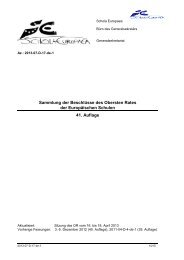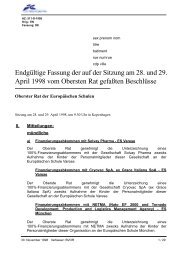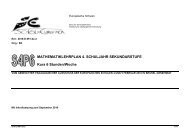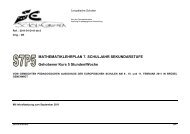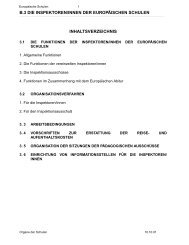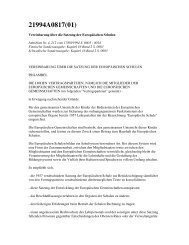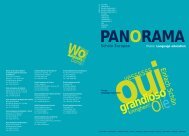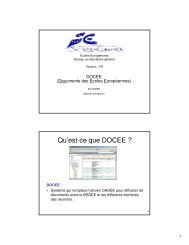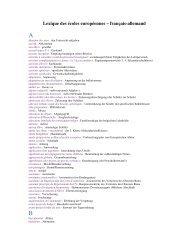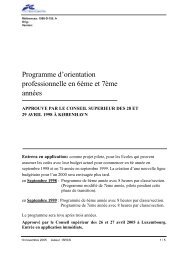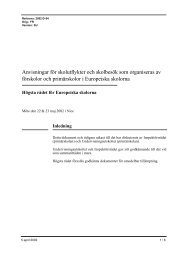External Evaluation of the European Baccalaureate (Annexes)
External Evaluation of the European Baccalaureate (Annexes)
External Evaluation of the European Baccalaureate (Annexes)
You also want an ePaper? Increase the reach of your titles
YUMPU automatically turns print PDFs into web optimized ePapers that Google loves.
Coursework<br />
assessment<br />
Oral<br />
examination<br />
2. Written Examination<br />
B mark (7 th year)<br />
For <strong>the</strong> <strong>European</strong> <strong>Baccalaureate</strong>,<br />
students take a written examination ( 4<br />
hours) in June <strong>of</strong> <strong>the</strong> final year. The exam<br />
consists <strong>of</strong> four short compulsory<br />
questions (50 marks in total) two<br />
questions on analysis, one on geometry<br />
and one on probability. Students should<br />
also answer two optional long questions,<br />
from a choice <strong>of</strong> three questions- one on<br />
analysis, one on geometry and one on<br />
probability (50 marks in total). Questions<br />
are based mainly on <strong>the</strong> year 7 syllabus,<br />
but may require knowledge <strong>of</strong> material<br />
studied in year 6. Marking takes into<br />
account method and interestingly<br />
presentation. A formula booklet is<br />
provided to support in <strong>the</strong> exams. Value<br />
<strong>of</strong> 36% <strong>of</strong> final.<br />
3. Oral examinations<br />
Oral examinations last twenty minutes.<br />
Before each oral examination candidates<br />
will be allowed twenty minutes <strong>of</strong><br />
preparation time. Value 24%<br />
A final mark <strong>of</strong> 60% or more will indicate a<br />
pass<br />
Oral participation and written work are<br />
formally assess in both years <strong>of</strong> <strong>the</strong><br />
programme as indicated above.<br />
There is a formal oral examination for<br />
students doing Ma<strong>the</strong>matics at this level.<br />
The oral examination is conducted by two<br />
examiners: <strong>the</strong> candidate's teacher and<br />
external examiner. Each candidate draws<br />
by lot an unmarked envelope containing a<br />
number. The candidate <strong>the</strong>n receives a<br />
question corresponding to that number.<br />
Candidates may reject <strong>the</strong> first question<br />
<strong>the</strong>y pick but will lose 20% <strong>of</strong> <strong>the</strong> marks<br />
awarded for <strong>the</strong> second question chosen.<br />
During <strong>the</strong> examination <strong>the</strong> candidate<br />
may use <strong>the</strong> document(s) supplied and<br />
any notes made in <strong>the</strong> preparation period.<br />
At <strong>the</strong> beginning <strong>of</strong> <strong>the</strong> examination <strong>the</strong><br />
candidate must be given <strong>the</strong> opportunity<br />
to set out his/her ideas on <strong>the</strong> question<br />
asked. If <strong>the</strong> candidate is incapable <strong>of</strong><br />
taking <strong>the</strong> initiative, <strong>the</strong> examiners should<br />
help by asking questions. The<br />
examination should gradually take <strong>the</strong><br />
form <strong>of</strong> a dialogue between <strong>the</strong> candidate<br />
and <strong>the</strong> examiners.<br />
92<br />
A final mark <strong>of</strong> approximately 40% will<br />
indicate a pass at D3 level on <strong>the</strong> scale A1,<br />
A2, B1, B2, B3, C1, C2, C3, D1, D2, D3<br />
None, summative assessment by<br />
examination only<br />
None, summative assessment by<br />
examination only



